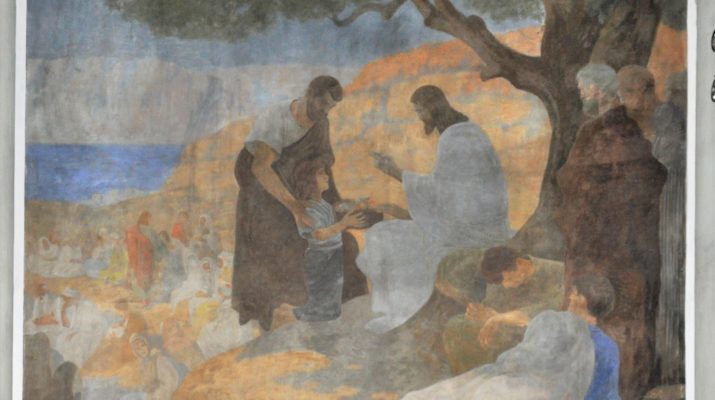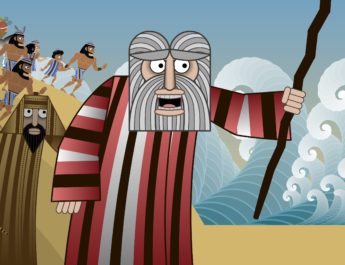Luke 6:17-26
Ordinary C12
17 He came downA with them and stoodB on a levelC place,D
A “came down” = katabaino. From kata (down, against, throughout, among) + baino (to walk, go). This is to come down whether from the sky to the ground or from higher ground to lower. It can be used in a literal or figurative sense.
B “stood” = histemi. This is to stand, place, establish, appoint, stand ready, be steadfast.
C “level” = pedinos. 1x in NT. From pedion (a plain) OR from pous (a foot in a literal or figurative sense). This is plain, flat – terrain that is easy to walk across.
D “place” = topos. This is a place or region. It is a smaller space that can only hold a limited number of people whereas chora is a larger place. Figuratively it could be an opportunity.
with a greatE crowdF of his disciplesG and a great multitudeH of peopleI
E “great” = polus. This is much, often, plenteous – a large number or a great extent.
F “crowd” = ochlos. Perhaps from echo (to have, hold, possess). This is a crowd, the common people, a rabble. Figuratively, it can refer to a riot.
G “disciples” = mathetes. From matheteuo (to make a disciple of); from manthano (to learn key facts, gain knowledge from experience; generally implies reflection as part of the learning process); from math– (thinking things through). This is a disciple, learner, or student. It is where we get “mathematics” from.
H “multitude” = plethos. From pletho (to fill, accomplish, supply; to fill to maximum capacity). This is fullness, multitude, great number.
I “people” = laos. This is the people or crowd – often used for the chosen people. This is where the word “laity” comes from.
from allJ Judea,K Jerusalem,L and the coastM of TyreN and Sidon.O
J “all” = pas. This is all or every.
K “Judea” = Ioudaia. From Hebrew Yehudah (Judah, son of Jacob, his tribal descendants, a name for the southern kingdom. Literally, it means praised); probably from yadah (to throw one’s hands into the air in a gesture of praise); from yad (hand). This is Judea, which was a Roman province.
L “Jerusalem” = Ierousalem. From Hebrew yerushalaim (probably foundation of peace); {from yarah (to throw, shoot, be stunned; to flow as water so figuratively to instruct or teach) + shalam (to make amends, to be complete or sound)}. This is Jerusalem, dwelling of peace.
M “coast” = paralios. 1x in NT. From para (from beside, by) + the same as halieus (a sailor, which implies fishermen; used for those who fish on saltwater and freshwater); from hals (salt or a body of salt water). This is the region by the sea, maritime.
N “Tyre” = Turos. 11x in NT. From Phoenician t-s-r (rock; “after the rocky formation on which the town was originally built”). This is Tyre, the capital of Phoenicia. See https://en.wiktionary.org/wiki/Tyre
O “Sidon” = Sidon. 10x in NT. From Phoenician tsydon (Sidon; probably meaning fishery or fishing town). This is Sidon – a city in Phoenicia. See https://en.wiktionary.org/wiki/Sidon & https://en.wikipedia.org/wiki/Sidon
18 They had comeP to hearQ him and to be healedR of their diseases;S
P “come” = erchomai. This is to come or go.
Q “hear” = akouo. This is hear or listen, but it also means to understand by hearing. This is where the word “acoustics” comes from.
R “healed” = iaomai. This is to heal, particularly from a physical illness, but it could also be a spiritual difficulty. This is to cure or make whole in a literal or figurative sense.
S “diseases” = nosos. 11x in NT. This refers to a disease that is chronic and enduring. It can also be used for a moral failing.
and those who were troubledT with uncleanU spiritsV were cured.W
T “troubled” = enochleo. Related to “crowd” in v17. 2x in NT. From en (in, on, at, by, with) + ochleo (to trouble, worry, force like a pressing crowd, to mob); {from ochlos (see note F above)}. This is to disturb, crowd in, trouble. It is to cause vexation with the strength of an unruly mob.
U “unclean” = akathartos. From a (not, without) + kathairo (to cleanse or purify by purging out unwanted elements); {from katharos (clean, clear, pure, unstained; clean in a literal, ritual, or spiritual sense; so, also guiltless, innocent or upright; something that is pure because it has been separated from the negative substance or aspect; spiritually clean because of God’s act of purifying)}. This is unclean or impure, whether a thing or a person. It is something that is not mixed with something that would taint. This is unclean in a ritual or moral sense. It can also mean demonic or foul.
V “spirits” = pneuma. From pneo (to blow, breath, breathe hard). This is wind, breath, or ghost. A breeze or a blast or air, a breath. Figuratively used for a spirit, the human soul or part of us that is rational. It is also used supernaturally for angels, demons, God, and the Holy Spirit. This is where pneumonia comes from.
W “cured” = therapeuo. From therapon (servant, attendant, minister); perhaps from theros (properly heat and so used for summer); from thero (to heat). This is to serve, care, attend, heal, or cure. Since it means to attend to, it can be used for doctors, but also for those who serve God. So, it can mean worship. This is where the word “therapy” comes from.
19 And all in the crowd were tryingX to touchY him, for powerZ came outAA from him and healed all of them.
X “trying” = zeteo. This is to seek, search for, desire. It is searching for something by inquiring or investigation. It can be seek in a literal or figurative sense. There is a Hebrew figure of speech “to seek God’s face” so it can also mean to worship God. Alternately, you could seek someone’s life i.e. plot to kill them.
Y “touch” = haptomai. From hapto (to touch, handle, kindle, lay hold of). This is a touch that has an impact on what is being touched – it has an influence on the recipient so that the recipient is changed.
Z “power” = dunamis. From dunamai (to be able, have power or ability). This is might, strength, physical power, efficacy, energy, and miraculous power. It is force literally or figuratively – the power of a miracle or the miracle itself.
AA “came out” = exerchomai. Related to “come” in v18. From ek (from, from out of) + erchomai (see note P above). This is to go out, depart, escape, proceed from, spread news abroad.
20 Then he looked upBB at his disciples and said:
“BlessedCC are you who are poor,DD
for yours is the kingdomEE of God.FF
BB “looked up” = epairo + ho + ophthalmos + autos. Literally, “lifted up his eyes.” Epairo is 19x in NT. From epi (on, upon, among, what is fitting) + airo (raise, take up, lift, remove). This is to lift up or raise in a literal or figurative sense. Figuratively, it could mean to exalt oneself. Ophthlamos is from optanomai (to appear, be seen by). This is eye or sight. It is used figuratively for the mind’s eye, a vision, or for envy.
CC “blessed” = makarios. From makar (happy); from mak– (to become long or large). This is blessed, happy, fortunate. It is when God’s grace/abundance is extended.
DD “poor” = ptochos. From ptosso (to crouch or cower as a beggar does). This is poor or destitute – someone who is extremely poor and bowed down because of a long struggle under poverty. Properly, it means bent over so figuratively it is someone who is deeply destitute and lacking tangible resources. This is a beggar – as extremely opposite a wealthy person as possible.
EE “kingdom” = basileia. Related to “came down” in v17. From basileus (king, emperor, sovereign); probably from basis (step, hence foot; a pace); from baino (see note A above). This is kingdom, rule, authority, sovereignty, royalty, a realm.
FF “God” = Theos. From Proto-Indo-European origins, meaning do, put, place. This is God or a god in general.
21 “Blessed are you who are hungryGG now,
for you will be filled.HH
“Blessed are you who weepII now,
for you will laugh.JJ
GG “are hungry” = peinao. From peina (hunger); related to penomai (working for a living; laborer, poor person; to work for daily bread); from peno (to toil to survive day by day). This is to hunger, be needy, or desire earnestly. It can be being famished in a definitive sense or in comparison to someone or something else. Figuratively, this means to crave.
HH “filled” = chortazo. 16x in NT. From chortos (food, grass, grain, hay; a place for feeding, a court, garden; by implication, a pasture or vegetation). This is to feed, fodder, fill, or satisfy. It carries the sense of abundantly supplied food – even gorging on food.
II “weep” = klaio. This is to weep, lament, or sob. It is weeping aloud.
JJ “laugh” = gelao. 2x in NT. This is to laugh or smile.
22 “Blessed are you when peopleKK hateLL you, and when they excludeMM you, revileNN you,
KK “people” = anthropos. Related to “looked up” in v20. Probably from aner (man, male, husband) + ops (eye, face); {from optanomai (see note BB above)}. This is human, humankind. Used for all genders.
LL “hate” = miseo. From misos (hatred). This word is used in two ways in the New Testament. One has to do with how we prioritize. In order to prioritize something the highest, it means we have to rank other things lower. We cannot have 10 number one priorities. So, the nine that are not number 1, we love less or we value them lower. We make a moral choice the springs from our values about where we put our time, efforts, energy, etc. The other way is detesting or hatred as we normally think of it. This sense has a particular affinity with persecuting the one we hate.
MM “exclude” = aphorizo. 10x in NT. From apo (from, away from) + horizo (to determine, set boundaries, appoint, designate, pre-determined; literally, this is setting horizons); {from the same as horion (boundary, territory); from horos (limit, boundary)}. This is to set off by a boundary – to divide, separate, exclude. It can also mean ostracize or keep aloof.
NN “revile” = oneidizo. 9x in NT. From oneidos (a personal disgrace that leads to harm to one’s reputation, a taunt or reproach); perhaps from the base of onoma (name, authority, cause, character, fame, reputation); perhaps from ginosko (know, recognize, learn from firsthand experience). This is to disgrace, insult, mock, blame, or curse someone so as to create shame. This is when a person or thing is considered guilty and deserving punishment. So, it can be denounce, revile, defame, or chide.
and defameOO you on account of the SonPP of Man.QQ
OO “defame” = ekballo + ho + onoma + su + hos + poneros. Literally, “cast out your name as evil.” Ekballo is from ek (from, from out of) + ballo (to throw, cast, place, put, drop). This is to throw, put out, produce, expel, banish. It is eject in a literal or figurative sense. Onoma may be from ginosko (know, recognize, learn from firsthand experience). This is a name, authority, cause, character, fame, reputation. The name was thought to include something of the essence of the person so it was not thought to be separate from the person. Poneros is related to “are hungry” in v21. From poneo (to toil); related to ponos (pain, trouble, labor, distress, suffering; toil, which implies anguish); from the base of penes (a laborer, poor person, starving or indigent person; someone who works for their living); from penomai (see note GG above). This is bad, evil, wicked, malicious, grievous, or toilsome. Properly, it is something that bears pain – it emphasizes the miseries and pains that come with evil. By contrast, the Greek kakos refers to evil as part of someone’s core character. Also contrasting the Greek sapros, which deals with falling away from a previously embodied virtue. This word can mean ill, diseased, morally culpable, derelict, vicious, malicious, or guilt. It can also refer to the devil or sinners.
PP “Son” = Huios. This is son, descendant – a son whether natural born or adopted. It can be used figuratively for other forms of kinship.
QQ “Man” = anthropos. Same as “people” in v22. See note KK above.
23 RejoiceRR in that daySS and leap for joy,TT
RR “rejoice” = chairo. From char– (to extend favor, lean towards, be inclined to be favorable towards). This is to rejoice, be glad or cheerful; a greeting. This is the root verb that the Greek word for “grace” comes from (charis).
SS “day” = hemera. Perhaps from hemai (to sit). This is day, time, or daybreak.
TT “leap for joy” = skirtao. 3x in NT – also used of John the Baptist greeting Jesus in the womb in Luke 1. From skairo (to skip). This is to leap or jump, to bound. It can refer to a quickening.
for surelyUU your rewardVV is great in heaven;WW for that is what their ancestorsXX didYY to the prophets.ZZ
UU “surely” = idou. From eido (to be aware, see, know, remember, appreciate). This is see! Lo! Behold! Look! Used to express surprise and or draw attention to the statement.
VV “reward” = misthos. This is wages, pay, or salary. It can also be reward, recompense, or punishment. It is pay for services rendered in a literal or figurative way, either good or bad.
WW “heaven” = ouranos. May be related to oros (mountain, hill) with the notion of height. This is the air, the sky, the atmosphere, and heaven. It is the sky that is visible and the spiritual heaven where God dwells. Heaven implies happiness, power, and eternity.
XX “ancestors” = pater. This is father in a literal or figurative sense. Could be elder, senior, ancestor, originator, or patriarch.
YY “did” = poieo. This is to make, do, act, construct, abide, or cause.
ZZ “prophets” = prophetes. From pro (before, in front of, earlier than) + phemi (to declare, say, use contrasts in speaking to shed light on one point of view); {from phao (to shine) or phaino (to bring light, cause to appear, shine, become visible or clear)}. This is a prophet or poet – one who speaks with inspiration from God.
24 “But woeAAA to you who are rich,BBB
for you have receivedCCC your consolation.DDD
AAA “woe” = ouai. This is alas or woe to show grief or to denounce something.
BBB “rich” = plousios. Related to “great” in v17. From ploutos (abundance, wealth, or riches; money, possessions, spiritual abundance, or a valuable bestowment); from polus (see note E above) OR pleo (to sail, voyage); {probably from pluno (to plunge – so to wash); from pluo (to flow)} OR pletho (to fill, accomplish, supply; to fill to maximum capacity). This is wealthy, having full resources. It can be a rich person or refer to God’s abundance.
CCC “received” = apecho. Related to “crowd” in v17 & “troubled” in v18. 19x in NT. From apo (from, away from) + echo (see note F above). This is to be distant, have fully, abstain, be paid, be distant, be enough. It is having something by detaching it from something else or releasing something else.
DDD “consolation” = paraklesis. From parakaleo (to call to, summon, invite, request, or beg; to exhort or admonish; to encourage, comfort, or console; has legal overtones and is used of one’s advocate in a courtroom); {from para (beside, by, in the presence of) + kaleo (to call by name, invite, to name, bid, summon, call aloud); {related to keleuo (to command, order, direct); from kelomai (to urge on)}}. This is calling someone for help, a personal exhortation, comfort, encouragement, joy, entreaty, urging. This word comes from a legal setting – as bringing evidence to advocate for another in court. This word is related to the word “Advocate” or paraclete used for the Holy Spirit.
25 “Woe to you who are fullEEE now,
for you will be hungry.
“Woe to you who are laughing now,
for you will mournFFF and weep.
26 “Woe to you when all speak wellGGG of you, for that is what their ancestors did to the false prophets.HHH
EEE “are full” = empiplemi. Related to “great” in v17 & “rich” in v24. 5x in NT. From en (in, on, at, by, with, among) + same as pleistos (most, very great, much, very numerous); {from polus (see note E above)}. This is to fill up or satisfy literally or figuratively.
FFF “mourn” = pentheo. 10x in NT. From penthos (mourning, sorrow, sadness, grief); perhaps from pascho (to be acted on for good or ill; often used for negative treatment; properly, feeling strong emotions – especially suffering; can also be the ability to feel suffering). This is used for grieving a death, but also figuratively for loss of hope or end of a relationship. This is embodied grief that is readily apparent. This is grief as a feeling or the act of grieving.
GGG “well” = kalos. From kalos (good, noble, beautiful, correct, or worthy; external signs of goodness like beauty, demonstrations of honorable character, showing moral virtues; a different word, agathos, speaks of intrinsic good). This is nobly, rightly, well-perceived, seen as appealing, morally pleasing, honorably.
HHH “false prophets” = pseudoprophetes. Related to “prophets” in v23. 11x in NT. From pseudes (false, lying, wicked); {from pseudomai (to lie, deceive, falsify)} + prophetes (see note ZZ above). This is false prophet – one who pretends they are prophesying from God or who teaches something that is false, but still attributes it to God.
Image credit: “Miracle of the Multiplication of Loaves” by Gebhard Fugel, 1909.




